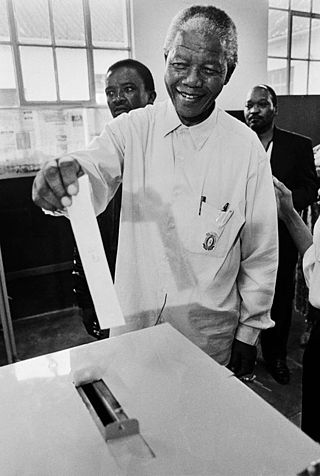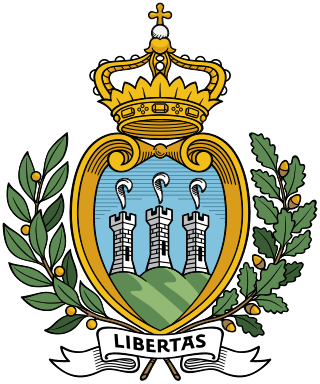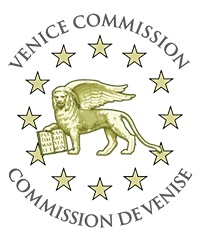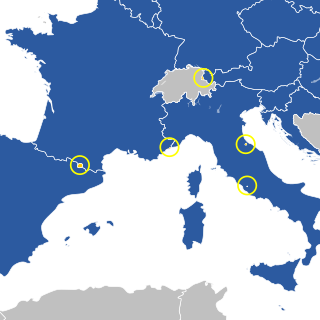
Democracy is a system of government in which state power is vested in the people or the general population of a state. According to the United Nations, democracy "provides an environment that respects human rights and fundamental freedoms, and in which the freely expressed will of people is exercised."
Oligarchy is a conceptual form of power structure in which power rests with a small number of people. These people may or may not be distinguished by one or several characteristics, such as nobility, fame, wealth, education, or corporate, religious, political, or military control.

San Marino, officially the Republic of San Marino and also known as the Most Serene Republic of San Marino, is a European microstate and country enclaved by Italy. Located on the northeastern side of the Apennine Mountains, San Marino is the fifth-smallest country in the world and covers a land area of just over 61 km2, with a population of 33,562.
As the only surviving medieval commune in the Italian Peninsula, the history of San Marino is intertwined with the medieval, Renaissance and modern-day history of the Italian peninsula, according to tradition beginning with its foundation in 301 AD.

The politics of the state of San Marino take place in a framework of a unitary parliamentary representative democratic republic, whereby the Captains Regent are the heads of state and heads of government. The country has a multi-party system. Executive power is exercised by the government. Legislative power is vested in both the government and the Grand and General Council. The judiciary is independent of the executive and the legislature.

The Sammarinese Christian Democratic Party is a Christian-democratic political party in San Marino.

San Marino elects on the national level a legislature. The Grand and General Council has 60 members, elected for a five-year term by semi-proportional representation with national majority bonus.

A democracy is a political system, or a system of decision-making within an institution, organization, or state, in which all members have an equal share of power. Modern democracies are characterized by two capabilities of their citizens that differentiate them fundamentally from earlier forms of government: to intervene in society and have their sovereign held accountable to the international laws of other governments of their kind. Democratic government is commonly juxtaposed with oligarchic and monarchic systems, which are ruled by a minority and a sole monarch respectively.

The Venice Commission, officially European Commission for Democracy through Law, is an advisory body of the Council of Europe, composed of independent experts in the field of constitutional law. It was created in 1990 after the fall of the Berlin Wall, at a time of urgent need for constitutional assistance in Central and Eastern Europe.

A directorial republic is a country ruled by a college of several people who jointly exercise the powers of a head of state and/or a head of government.

The Grand and General Council is the parliament of San Marino. The council has 60 members elected for a five-year term.

Currently, all of the European microstates have some form of relations with the European Union (EU).

A popular referendum, depending on jurisdiction also known as a citizens' veto, people's veto, veto referendum, citizen referendum, abrogative referendum, rejective referendum, suspensive referendum, and statute referendum, is a type of a referendum that provides a means by which a petition signed by a certain minimum number of registered voters can force a public vote (plebiscite) on an existing statute, constitutional amendment, charter amendment, or ordinance; in its minimal form, it simply obliges the executive or legislative bodies to consider the subject by submitting it to the order of the day. It is a form of direct democracy.
The Arengo was the name of the assembly that ruled San Marino from the fifth century A.D. to 1243, and of the popular councils which regulated the political life in Northern Italy free comuni in the Middle Ages as well. It was made up of the heads of San Marino's Great families and had no leader or fixed meeting place. This made San Marino almost unique in the period as a state that had no Head of State. However this form of rule was cumbersome and the Arengo was crippled by feuds between the Great Families. By the early 13th century the Arengo had become so dysfunctional that the citizens of San Marino decided to elect their own assembly, which they called the Grand and General Council. This assembly became very powerful, and by 1243 the Pope, who was the nominal ruler of San Marino, made the Grand and General Council the supreme body of San Marino.
In governance, sortition is the selection of public officials or jurors using a random representative sample. This minimizes factionalism, since those selected to serve can prioritize deliberating on the policy decisions in front of them instead of campaigning. In ancient Athenian democracy, sortition was the traditional and primary method for appointing political officials, and its use was regarded as a principal characteristic of democracy.

The fatti di Rovereta was a constitutional crisis in San Marino in 1957 in which the Grand and General Council was deliberately rendered inquorate to prevent the scheduled election of Captains-Regent. A provisional government was established in the village of Rovereta, in opposition to the outgoing Captains-Regent whose term had expired.

Grand and General Council elections were held in San Marino on 25 March 1906.

General elections were held in San Marino on 10 June 1906.

General elections were held in San Marino on 19 June 1909 to elect the second term of the Grand and General Council.

Four referendums were held in San Marino on 16 March 2008. Voters were asked questions on the voting system, raising salaries in line with inflation, projects, and the abolition of temporary employment contracts. As voter turnout was just 35.36%, all four referendums failed to pass the 32% quorum of registered voters required.











